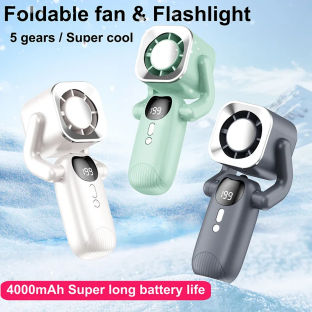Can handheld small fan really beat the summer heat?
As the summer heatwave sweeps across the country, handheld small fan has become a common sight on the streets, on desks, and in backpacks. However, are they truly "cooling artifacts" or merely flashy, yet ineffective, "useless toys" that offer a temporary boost in popularity? Can they truly help us combat the summer heat? This question lingers in the minds of many consumers.
For localized relief only
Handheld small fans are indeed useful for providing immediate, localized cooling. They can provide a brief boost in comfort for those moving outdoors briefly, in hot, unaired corners indoors, or for those sensitive to air conditioning. However, their cooling capacity is highly limited to small, wind-exposed areas like the face and neck, and they are ineffective in reducing ambient temperature. In extremely hot, humid, and windless environments, their wind power often proves insufficient to combat the all-encompassing heatwave.

Limited Application Scenarios
The practicality of handheld small fans depends on their intended use. Urban commuting: Relieve the stuffiness while walking under the scorching sun, squeezing through subways and buses, or waiting at traffic lights.
Outdoor activities: Provide instant cooling during breaks from non-strenuous activities like camping, queuing, and attending performances.
Indoor auxiliary use: Supplemental cooling in spaces with insufficient air conditioning coverage and poor air circulation.
Specific populations: Those who are sensitive to air conditioning, pregnant women, and those who work in specific environments.
However, relying on a small fan may be insufficient for prolonged exposure to strong sunlight or strenuous exercise.
Noise, battery life, and wind speed limitations
Handheld small fans have many limitations and several obvious drawbacks. First, there's the noise issue: Some low-priced or poorly designed products emit a noticeable motor hum or wind noise when used at full power, which can attract attention in a quiet office or library. Second, there's the concern about battery life: While some mid- to high-end products have improved battery life, mainstream products typically only last a few hours at full power. Frequent charging or battery shutdowns when low on power are annoying, especially when out and about. Finally, limited wind power is a natural drawback. In the face of a scorching heat wave, the wind from a small fan can sometimes feel like scratching an itch, making it ineffective, especially for those who need to cool a large area or require strong wind.
Choose rationally and purchase based on your needs.
With a wide variety of handheld small fans available, consumers should clarify their needs and make a rational purchase. If the fan is primarily for short commutes or indoor cooling, a basic model will suffice. If you are noise-sensitive or will be using it for extended periods outdoors, look for models that claim to be quiet, have long battery life, and have multiple power settings. USB charging and removable battery combinations often offer greater flexibility.
| Aspect | Summary |
|---|---|
| Core Question | Are handheld fans effective cooling tools or temporary gimmicks against heat |
| Cooling Effectiveness | Immediate localized relief for face/neck only no ambient temperature reduction insufficient in extreme heat humidity |
| Application Scenarios | Urban commuting outdoor breaks indoor auxiliary cooling specific groups AC sensitive pregnant workers |
| Limitations | Noise at high speed short battery life limited wind power ineffective large areas |
| Recommendations | Basic models for short commutes advanced for prolonged outdoor use prioritize USB charging removable batteries |




